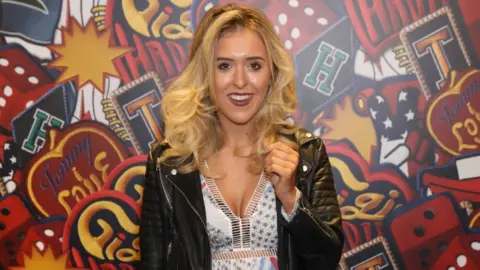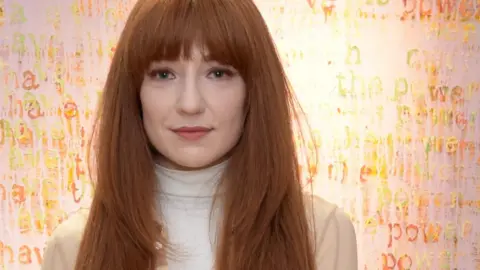Social media influencers face relentless abuse, MPs are told
 Getty Images
Getty ImagesA popular social media influencer has told MPs about the "relentless" abuse she receives from online trolls.
Em Sheldon said there was "a dark space of the internet where people spend all day writing about us".
"They think we deserve it because we put ourselves online," she told the DCMS committee, which is looking into the growth of influencer culture.
Influencers are usually seen as people who use their social media platforms to promote brands, products and services.
According to another expert witness, however, the term is an "ambiguous" one that is often used pejoratively, particularly against women.
"Sometimes the conversation only relates to commercial activity, but one person's influencer might be another's artist," said Dr Francesca Sobande of Cardiff University.
"Influencer has become a deliberately feminised term," said Dr Crystal Abidin from Australia's Curtin University during Tuesday's evidence session.
"Influencers aren't seen as people who are creating content. They're seen as people putting themselves out there to win followers and make money."
According to Sheldon, who has more than 117,000 followers on Instagram, certain people are "so angry at us for making money".
She said her followers would be "disgusted" if she revealed the full extent of the abuse she received, particularly from middle-aged women.
Appearing later on ITV News, she said her appearance before the DCMS committee had itself led to venomous messages.
 EPA
EPASheldon, who posts regularly about her lifestyle, said online threats were so severe she no longer felt safe enough to go out for a run by herself.
"People think they have a right to know where I live, who my friends and families are and so on," she went on. "These dark forums need shutting down.
"I wish social media required some form of personal information, even for those who post anonymously. It would deter abusers and help the police."
Sheldon's comments follow widespread revulsion at the racist abuse directed at some of England's football players in the wake of their Euro final defeat.
Marcus Rashford, Bukayo Saka and Jadon Sancho were targeted after they missed penalties at the end of Sunday's match against Italy at Wembley.
The government's draft Online Safety Bill, announced in the Queen's Speech in May, places new duties on social media firms to remove harmful or illegal content.
It says social media firms will have to remove harmful content quickly or potentially face multi-billion-pound fines.
Yet singer Nicola Roberts has turned down a request to endorse it, saying it does not do enough to stop people who have been banned from setting up new accounts.
"I am unconcerned with chasing the rabbit," the Girls Aloud and Masked Singer star said in a statement. "I would rather just fill the hole."
'Blocking followers'
Roberts suffered online abuse and stalking at the hands of an ex-boyfriend, who sent her 3,000 messages from 35 fake Twitter accounts after they split in 2008.
"If you block people they make 10 other accounts," said Sheldon, who claimed her abusers routinely complain to the ASA (Advertising Standards Authority) about her posts.
Influencers are required to make it clear to their followers when their posts are advertisements and can be sanctioned by the UK advertising watchdog if they do not.
 Getty Images
Getty ImagesFormer model Katie Price has launched a petition calling for there to be a legal requirement that personal accounts on sites such as Facebook and Twitter are linked to a verified form of identification.
Love Island presenter Laura Whitmore has urged her followers to add their names to it, saying it "has never been right" that "anyone can say anything online without any accountability".
According to Dr Sobande, however, removing users' anonymity "is not the magic solution people think it is".
"For me the bigger issue is how these issues will be addressed when the abusers are identified," she told MPs.
'Hamster on a wheel'
Sheldon said that maintaining a social media presence was a "24/7" job and that she sometimes feels "like a hamster on a wheel".
"We don't have a union but we do help each other," she said of her fellow influencers, whom she said lacked the "level of protection" afforded to mainstream celebrities.
"They can be hurt emotionally but their businesses and careers are untouchable," she continued. "It's not a level playing field."
"Being an influencer is not a job you can switch off from," said Dr Abidin, adding that those wishing to become one themselves should "think about more than the glamour".
Yet Sheldon said there were positive sides to the job, citing a recent visit to New York as an example of a "really good and fulfilling" experience.
"I like that I can give people escapism, especially during the pandemic," said the 27-year-old, who started out as a blogger in 2012.
Snapchat is among many social media companies to have an anti-bullying policy, as well as an in-house app promoting good mental health.
It said its users' accounts were "private by default" and that the site had no public comments or open newsfeed where hate speech could be broadcast.
Facebook and Instagram have similar policies including message controls and filters and direct people in need of crisis support to charities including The Samaritans and Beat.
Tik Tok and YouTube have also been contacted for comment.

Follow us on Facebook, or on Twitter @BBCNewsEnts. If you have a story suggestion email [email protected].
